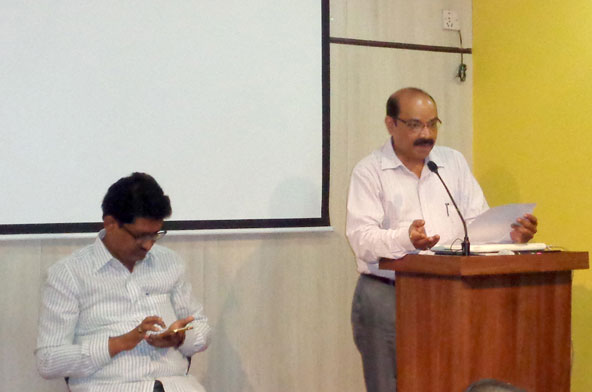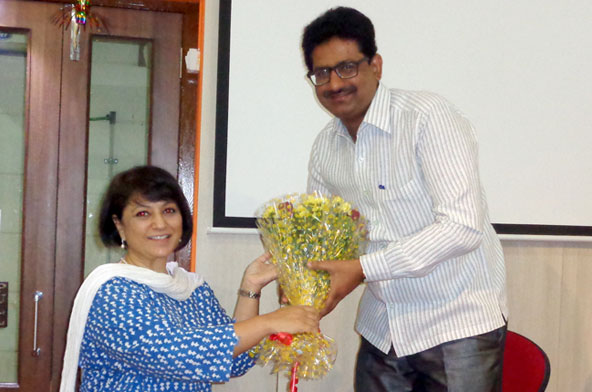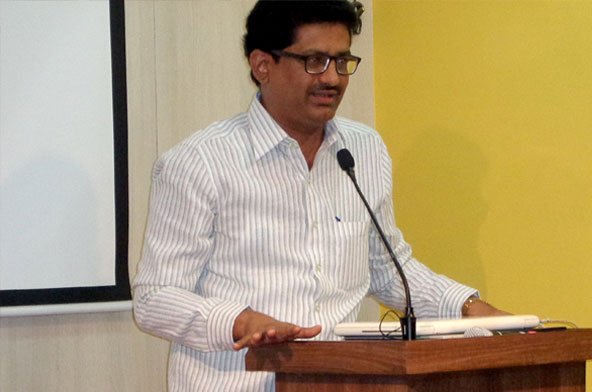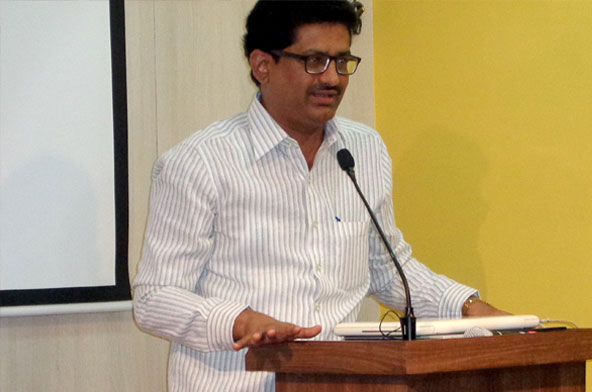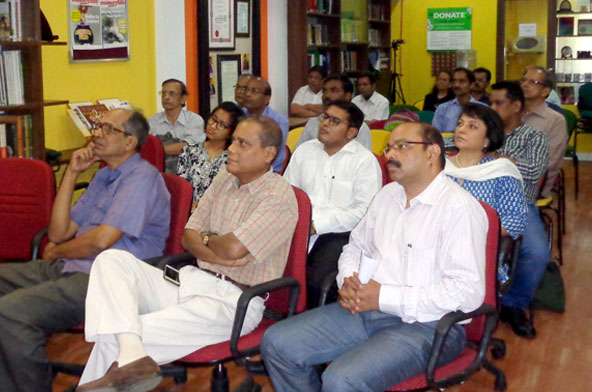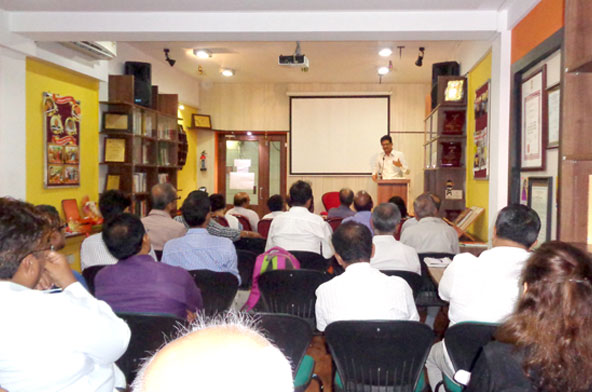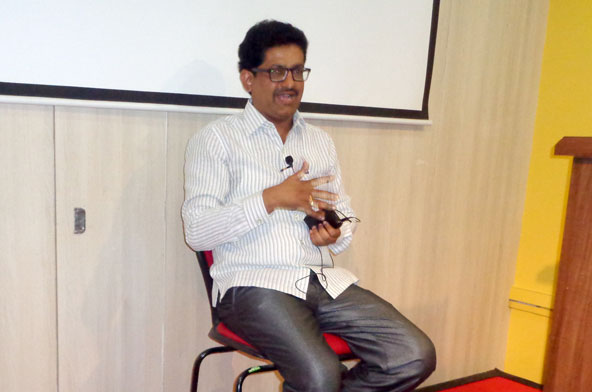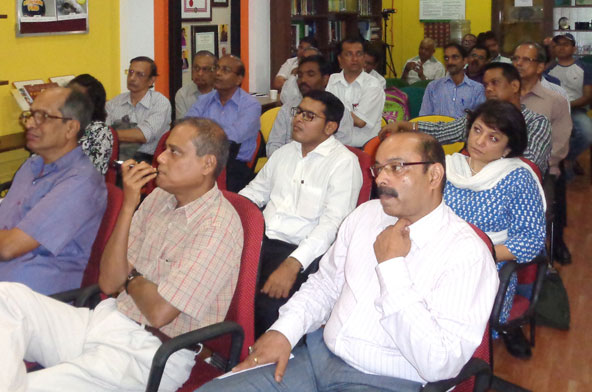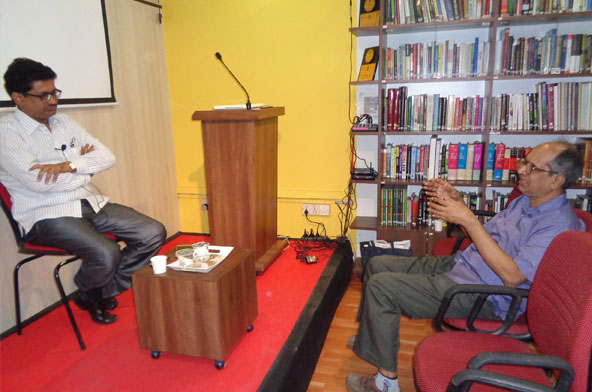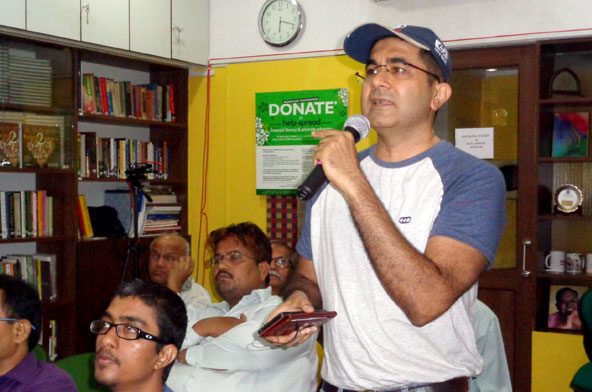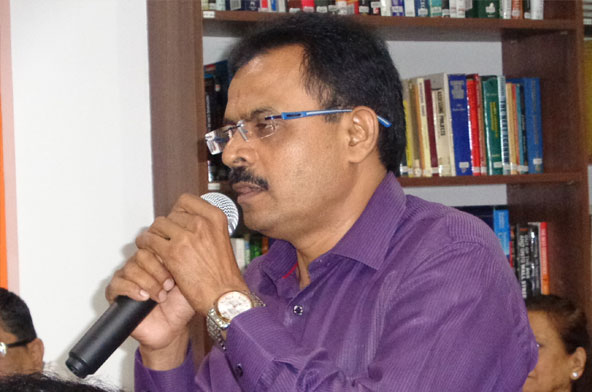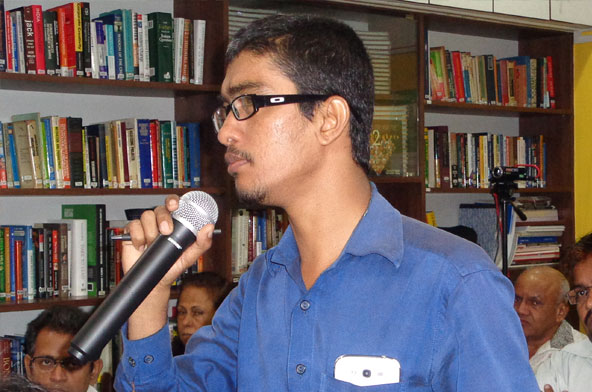
Successful activism requires the use of multiple acts and strategies to achieve the goal of obtaining relevant information quickly and using it for the good of society. That was the message from Anil Galgali, an RTI activist whose prolific work, using information gleaned from government sources and backed by authenticated documents, has repeatedly made media headlines and exposé the misuse of power, corruption and diversion of funds by government officers and politicians. Mr Galgali generously shared his modus operandi with Moneylife Foundation members at a talk titled “Some Tips to Success in RTI on civic and infrastructure issues that affect us” on Wednesday.
One interesting observation was that filing appeals to under the Right to Information (RTI) Act, is time consuming. Instead, he has two suggestions. The first, is to take the opportunity to inspect documents, under section 4 of the Act, which allows the person filing the application to meet RTI officials and persuade them to part with the information, or collect authenticated photocopies on the spot. It easily eliminates the 30 days period under the Act to respond to a query and obviates the need to file an appeal. He also suggested that filing a fresh application, that is differently worded, often works better than an appeal. Sometimes activists themselves are not able to frame their query well leading to a lack of response, he said. Sometimes a recalcitrant information officer may have been transferred and a new official will look at a fresh application differently. The long pendency of cases at the appeal stage had made appeals less effective, he said. “Merely filing application may not give you relevant information. Sometimes, you need to visit the office from where you are seeking information and enquire about the status of your RTI application. This method has proved to be beneficial for me over the years”, he said.
He was also a strong votary of using mechanisms such as the Lok Shahi Din, to seek redress, when information was being deliberately denied or suppressed.
Mr Galgali, who is a freelance journalist since 1994 as well as Editor of Agnishila, a monthly magazine, published in Hindi shared his experiences of using RTI Act to obtain relevant information from the authorities.
Using RTI, Mr Galgali had brought to the fore issues related with social environment and especially those close to the common man’s heart. Through RTI, he has exposed several mischiefs played by various authorities like BrihanMumbai Municipal Corp (BMC), MMRDA, Mumbai Metro and Mumbai University.
In one case, he filed an RTI application in April 2015, to expose how the BMC spent Rs1.70 crore on hiring retired officers as officer on special duty (OSD) and consultants.
According to the RTI activist, by appointing and giving extensions to these officials, the BMC Commissioner had flouted the norms. He said, “In a special order passed by the Court in the Dr Jagganath Dhone v/s Government of Maharashtra, on 14 January 2010, the Court had directed to make such appointments but only after getting the necessary permission from the Government. However, the then BMC Commissioner, without taking any permission from the Government, made sure that these 40 officers are appointed.”
Mr Galgali says he received very positive reply from the present Municipal Commissioner Ajoy Mehta, who has now cancelled appointments of OSD and consultants in BMC.
In another case in September 2016, the RTI activist exposed how Reliance Industries Ltd (RIL), India’s largest private sector company owe a whopping Rs1,576.90 crore as additional premium charges to the Mumbai Metropolitan Region Development Authority (MMRDA) as a lease-holder of two plots at the Bandra Kurla Complex in Mumbai.
RIL, has, however, said it is waiting for further communication from MMRDA as there was a court stay for almost five years on construction on plot no C/64. A report from The Hindu quoted RIL spokesperson as saying, “MMRDA had recognised the force majeure with regards to Plot Number C/64, as there was a court stay on construction between October 2007 and March 2012. MMRDA, in the last authority meeting, decided to appoint a committee and we are awaiting further communication from it on the same.”
Mr Galgali also used the RTI to point out lacunae in the Mumbai University as well. In one case, he pointed towards foreign tours undertaken by several Vice-Chancellors across Maharashtra using public funds. In another case, Mr Galgali procured information about Mumbai University’s VC Dr Sanjay Deshmukh’s failure to clear LLB examination. Before being appointed as vice chancellor of Mumbai University, Dr Deshmukh had appeared for LLB examination, which he could not clear, the information procured by Mr Galgali revealed.
Earlier in January 2016, the RTI activist, pointed out how a land admeasuring 2,000 Sq Mtrs had been allotted to the Bharatiya Janata Party (BJP)’s member of Parliament (MP) and yester year actress Hema Malini for a pittance Rs70,000 (@Rs35 per Sq Mtrs) against its current market value in crores of rupees. Mr Galgali sought intervention from Maharashtra Chief Minister (CM) Devendra Fadnavis in the matter, while expressing surprise on the intentions of the Government to allot land on the basis of rates in 1976 rather than the current ready reckoner rates.
“During our meeting, the Maharashtra CM has assured to look into similar matters as well. Hope soon, the state government takes back its land that is lying vacant for development purposes,” Mr Galgali says.
Since the implementation of RTI Act in 2005, Maharashtra has witnessed 12 deaths and 24 assaults on activists. When asked, if he feels threatened while procuring information under RTI on several ‘sensitive’ issues, Mr Galgali says, “Ever since I have been using RTI, I never received any threat nor faced any intimidation from anyone. But this is how life is. Some people tried to bribe me through advertisement in my magazine. Nevertheless, I told them, ours is a small publication, whose turnover is lesser than the advertisements they were proposing. We rejected it. In my personal opinion, you need two hands for clapping. I may be wrong. But this may answer why there are attacks on some RTI activists.”
He also advised RTI activists to be cautious and ensure that their work is done in public interest and not to push an agenda.
Like other effective RTI activists, Mr Galgali also expressed concern at the growing trend among politicians and bureaucrats to tarnish reputation of activists and accuse them of having ulterior motives. “I agree that there are few people, who may be misusing the RTI Act. One person even asked a query in over 6,500 words, which is quite huge for any public information officer (PIO) to respond in 30 days. But then we need to educate people on using RTI Act properly to get desired information and then using alternate forums, like the Lok Shahi Din or Lokayukt office, to take the matter to its conclusion,” Mr Galgali, concluded.
Few days ago, Mr Galgali, using information obtained through RTI, revealed how Maharashtra’s former minister Eknath Khadse has not paid the rent arrears worth Rs15.5 lakh for using the government bungalow, after stepping down as minister in June 2016. He says, “A minister can use his official residence free for a period of 15 days, from the date that he ceases to be a minister. After that upon obtaining permission from the Government, he can retain the residence or bungalow for three more months on a payment of Rs25 per square foot. After three months, this charge is doubled to Rs50 per sq ft. However, it appears, neither the minister nor officials, who allowed Mr Khadse to stay in the bungalow, are aware about these provisions.”
An interesting observation that Mr Galgali made in this connection was that MLAs, bureaucrats and corporators are often unaware of the rules and GRs issued from time to time; consequently, they are sometimes caught on the wrong foot without meaning to violate the law. This is often the case when they refuse to vacate government bungalows after their term. Even here, the more savvy ones quickly pay up and avoid embarrassment in the media. But Mr Galgali’s point was that the government itself ought to spend some time in educating and guiding elected representatives on their rights and responsibilities, especially when it came to perks and privileges. “Not all politicians are corrupt, some want to do the correct thing but don’t know the rules and GRs”, he said.
Mr Galgali then replied to several questions asked by the audience and also offered his help in providing specific guidance on some cases.


